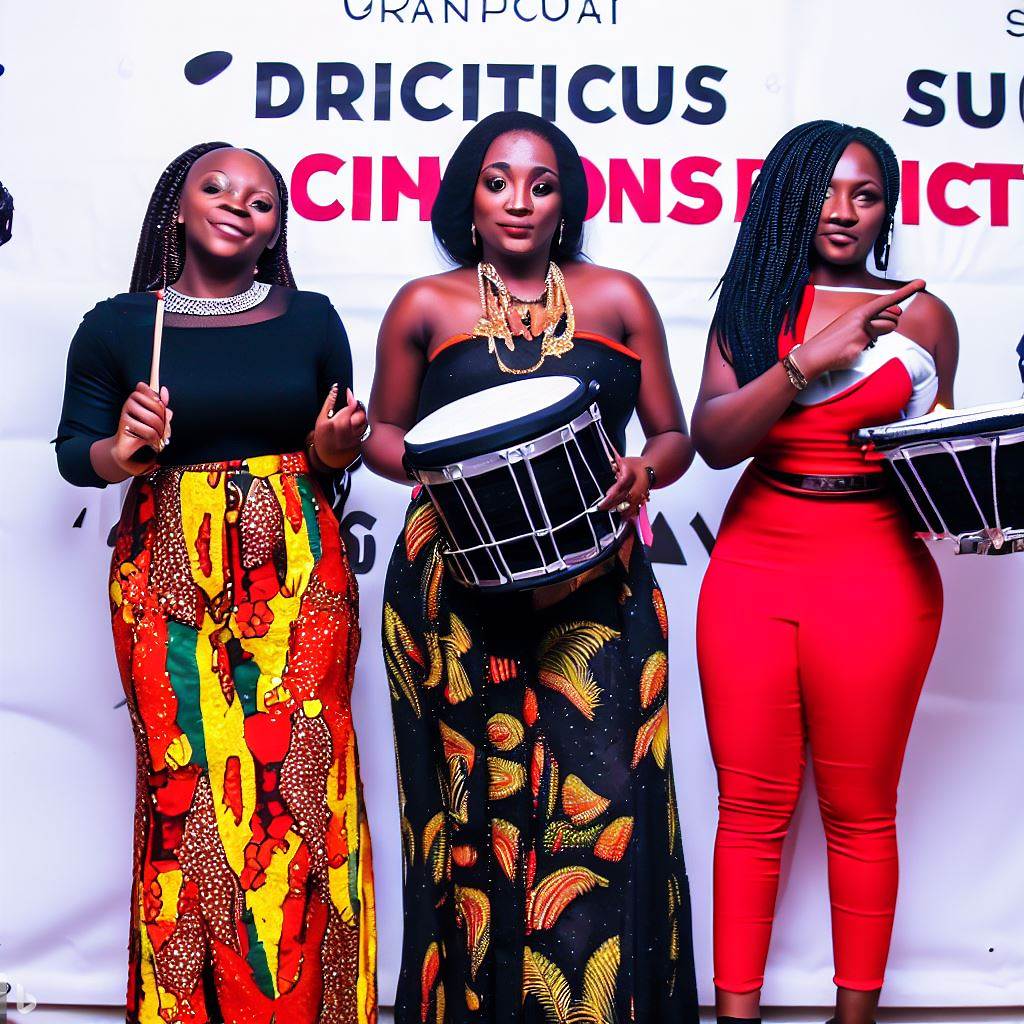Introduction
The concert promotion industry in Nigeria has experienced significant growth in recent years.
This blog post aims to explore the ethical responsibilities of concert promoters in Nigeria.
- Nigeria’s concert promotion industry is a dynamic, ever-evolving sector vital to the music landscape.
- Concert promoters serve as crucial intermediaries, linking artists and audiences for memorable experiences.
- The industry’s growth mirrors Nigeria’s vibrant music culture, offering diverse genres and talent.
- Concerts, often grand spectacles, are a social glue, uniting people through shared musical passions.
- Behind the glitz, ethical concerns loom, underscoring the necessity of exploring promoters’ moral responsibilities.
The Purpose of This Blog Post
- This blog post delves into the ethical obligations of concert promoters in Nigeria’s music ecosystem.
- We aim to foster awareness among promoters, artists, and fans regarding ethical considerations.
- Ethical dilemmas like safety, ticket pricing, and artist relations demand attention and discussion.
- Through dialogue and self-reflection, we aspire to enhance the industry’s integrity and sustainability.
- Let’s navigate the complex landscape together, ensuring that Nigerian concerts thrive ethically and harmoniously.
Definition of ethical responsibilities
Ethical principles and guidelines
Ethical responsibilities refer to the duties and obligations that concert promoters in Nigeria have towards ensuring moral behavior and adherence to ethical principles in their professional practices.
These responsibilities are based on a set of guidelines that govern the conduct of individuals and organizations involved in concert promotion.
Ethical principles outline the moral values and standards that should guide decision-making and behavior in the industry.
- Honesty:Con cert promoters should strive to be transparent and truthful in their dealings with artists, venues, suppliers, and audiences.
They should not engage in deceptive practices or provide false information. - Integrity: Promoters must uphold high moral and ethical standards by acting with integrity, fairness, and consistency.
They should not engage in bribery, corruption, or any other form of unethical behavior. - Respect: Promoters should treat all stakeholders, including artists, venues, suppliers, and audiences, with respect and dignity.
They should value their rights, opinions, and cultural sensitivities. - Fairness: promoters should ensure fair treatment and equal opportunities for all artists, regardless of their background or status.
They should not engage in discriminatory practices or favouritism. - Responsibility: Promoters have a responsibility to organise safe and secure concerts that prioritise the well-being of artists and audiences.
They should comply with relevant laws, regulations, and industry standards.
The importance of ethical conduct in concert promotion
Ethical conduct is crucial in concert promotion for several reasons:
- Reputation: Promoters with a reputation for ethical behaviour are more likely to attract artists, venues, and sponsors, leading to long-term success and profitability.
- Trust: Ethical conduct builds trust with stakeholders, including artists, venues, and audiences. This trust is essential for maintaining healthy relationships and securing future partnerships.
- Professionalism: Ethical conduct reflects professionalism and a commitment to high-quality concerts.
It demonstrates that promoters prioritize the interests of artists and audiences above personal gain. - Compliance: Adherence to ethical principles ensures compliance with legal and regulatory requirements, reducing the risk of legal issues, penalties, and damage to the promoter’s reputation.
- Social impact: Ethical concert promotion can have a positive social impact by promoting cultural diversity, inclusion, and responsible business practices.
It contributes to the overall development of the music industry in Nigeria.
Ethical responsibilities in concert promotion involve adhering to a set of principles and guidelines that guide moral behavior and decision-making.
Concert promoters in Nigeria must prioritize honesty, integrity, respect, fairness, and responsibility in their professional practices.
Ethical conduct is essential for maintaining reputation, building trust, demonstrating professionalism, ensuring compliance, and making a positive social impact in the industry.
By embracing these ethical responsibilities, concert promoters can contribute to the growth and development of the music industry in Nigeria.
Legal obligations of concert promoters in Nigeria
Overview of relevant laws and regulations
- Concert promoters in Nigeria are subject to several laws and regulations.
- The Nigerian Copyright Act protects the rights of artists and musicians.
- The Nigerian Entertainment Industry Regulatory Commission (NEIRC) oversees the entertainment sector.
- Concert promoters must obtain a license from the NEIRC to organize events.
- They need to comply with health and safety regulations to ensure the well-being of attendees.
- The Nigerian Police Force provides security guidelines that concert promoters must follow.
- Additionally, promoters must adhere to taxation laws and obtain necessary permits.
- Failure to comply with these legal requirements can result in severe consequences.
Discussion on the consequences of failing to comply with legal requirements
- Firstly, concert promoters can face financial penalties for non-compliance.
- Non-compliant promoters may have their licenses revoked, leading to cancelation of events.
- Promoters could also face lawsuits from artists or attendees if rights or safety is compromised.
- Moreover, non-compliant promoters risk damage to their reputation and credibility.
- The NEIRC can blacklist non-compliant promoters, affecting their future prospects in the industry.
- Non-compliance with taxation laws can result in legal action and hefty fines.
- Failure to follow security guidelines may lead to violent incidents or terrorist threats.
- If any accident or injury occurs at the event, promoters can be held legally liable.
- Additionally, promoters may face difficulties in obtaining necessary permits for future events.
- Non-compliance tarnishes the image of the entire concert industry in Nigeria.
- By failing to meet legal obligations, promoters undermine the growth and development of the industry.
Concert promoters in Nigeria have legal obligations they must fulfill.
The relevant laws and regulations, including copyright, licensing, health and safety, taxation, and security guidelines, should be strictly adhered to.
Failure to comply can result in financial penalties, license revocation, lawsuits, reputational damage, and other severe consequences.
It is crucial for promoters to understand and meet their legal responsibilities to ensure the success and sustainability of the concert industry in Nigeria.
Read: Celebrating Nigeria’s Foley Artists: Unsung Heroes of Sound
Duty towards artists and performers
Ensuring fair contracts and agreements
Concert promoters in Nigeria have a significant ethical responsibility towards artists and performers.
One crucial aspect of this duty is ensuring fair contracts and agreements are in place.
Promoters must engage in transparent negotiations that prioritize the rights and interests of the artists.
The first step in fulfilling this duty is to have clear and comprehensive contracts that outline the terms and conditions of the agreement.
These contracts should include details regarding compensation, performance duration, intellectual property rights, and any other relevant aspects.
Furthermore, concert promoters should ensure that artists understand the terms of the contract fully.
It is their responsibility to explain any legal jargon or complicated clauses to the artists, ensuring they have a clear understanding of what they are agreeing to.
Providing safe and suitable performance conditions
Another important ethical responsibility of concert promoters in Nigeria is to provide safe and suitable performance conditions for artists and performers.
This includes taking measures to ensure the physical well-being and comfort of artists during concerts and events.
Promoters should ensure that the concert venue meets safety standards and is adequately equipped to handle the needs of the artists and performers.
This may involve providing appropriate sound and lighting systems, ensuring suitable backstage facilities, and making necessary arrangements for accommodation and transportation.
Additionally, promoters should consider the comfort and well-being of artists during their performances.
This means providing adequate breaks, refreshments, and ensuring that the artists are not subjected to excessive physical or mental stress.
Discussion on the importance of fair compensation and royalties
Fair compensation and royalties are of utmost importance in the ethical responsibilities of concert promoters in Nigeria.
Artists and performers invest their time, effort, and talent into their work, and they deserve to be adequately compensated for their contributions.
Promoters should engage in fair and transparent negotiations regarding compensation.
This includes considering the artist’s market value, the scope of the performance, and the potential revenue generated from the event.
By offering fair compensation, promoters contribute to the sustainability and development of the local music industry.
Furthermore, promoters must respect and uphold the rights of artists regarding royalties.
They should ensure that artists receive their fair share of royalties from ticket sales, merchandise, and other revenue streams.
This financial support allows artists to continue creating music and contributes to the overall growth of the music industry.
Concert promoters in Nigeria have ethical responsibilities towards artists and performers.
These responsibilities include ensuring fair contracts and agreements, providing safe performance conditions, and discussing the importance of fair compensation and royalties.
By fulfilling these duties, promoters can foster a positive and sustainable environment for artists in the Nigerian music industry.
Read: How to Become a Successful PR Specialist in Nigeria
Responsibility towards concert attendees
Concert promoters in Nigeria have a crucial ethical responsibility towards their attendees, which involves various aspects:
Ensuring safety and security at concert venues
- Concert promoters must prioritize the safety and security of attendees.
- They should collaborate with venue management to implement proper security measures.
- This includes hiring trained security personnel and conducting thorough security checks.
- Emergency evacuation plans and medical assistance should also be in place.
- Regular audits and inspections should be conducted to ensure compliance with safety regulations.
Providing accurate and transparent information about concerts
- Concert promoters should provide detailed and accurate information about concerts.
- This includes the date, time, venue, lineup, and any relevant updates or changes.
- Transparent ticket pricing and availability should be communicated to avoid misleading attendees.
- Attendees should be informed about entry requirements and any prohibited items.
- Clear communication channels should be established to address attendees’ queries and concerns.
Dealing with customer complaints and grievances
- Concert promoters should have a mechanism in place to handle customer complaints and grievances.
- Attendees should be able to report issues related to safety, security, or any other concerns.
- A dedicated customer service team should be available to address and resolve these complaints.
- Response time and resolution should be prompt and satisfactory.
- Feedback from attendees should be actively sought and used for improvement.
By fulfilling their responsibilities towards concert attendees, promoters can maintain trust and enhance the concert experience for everyone involved.
Read: Nigeria’s Animation Industry: Past, Present, Future
Ethical considerations related to sustainability and the environment
Encouraging eco-friendly practices in concert promotion
- Concert promoters should prioritize engaging in eco-friendly practices to minimize negative impacts on the environment.
- One way to encourage eco-friendly practices is by selecting concert venues with green certifications and sustainable infrastructure.
- Promoters can also incentivize attendees to use public transportation or carpooling options to reduce carbon emissions.
- Utilizing digital ticketing systems and promoting paperless communication can significantly reduce paper waste.
- Another eco-friendly practice is to provide recycling stations and educate concert-goers on proper waste disposal.
Strategies for minimising waste and carbon footprint
- Promoters should collaborate with vendors and suppliers who prioritize sustainability and offer environmentally-friendly products.
- Using biodegradable or reusable food and beverage containers at concerts is a step towards reducing plastic waste.
- By purchasing renewable energy to power concerts, promoters can minimize their carbon footprint.
- Encouraging artists to use sustainable stage designs and lighting systems can greatly reduce energy consumption.
- Implementing waste reduction strategies, such as composting and donating excess food, can minimize concert waste.
By incorporating eco-friendly practices and minimizing waste, concert promoters in Nigeria can demonstrate their commitment to ethical responsibilities towards sustainability and the environment.
Consciously choosing to cut carbon emissions, curb waste, and support eco-friendly options will inspire attendees to do the same.
Concert promoters have a unique platform to influence the masses and raise awareness about the importance of sustainable practices.
By selecting eco-friendly venues and collaborating with vendors who share the same values, promoters can set an example of responsible event management.
Adopting digital ticketing systems and promoting paperless communication not only saves resources but also provides convenience to concert-goers.
Recycling stations throughout the concert venue and clear communication on waste disposal methods educate attendees on proper recycling habits.
Furthermore, collaborating with artists to incorporate sustainable stage designs and lighting systems can significantly reduce energy consumption.
Promoters can also source renewable energy to power the concerts, further minimizing their carbon footprint.
Limiting plastic waste by using biodegradable or reusable food and beverage containers is an effective strategy.
Additionally, waste reduction initiatives such as composting and donating excess food can further minimize the environmental impact of concerts.
Read: Building a Foley Studio in Nigeria: Costs and Considerations

Navigating cultural sensitivities
Respecting local customs and cultural norms
- Research and understand the local customs and cultural norms before organizing a concert.
- Show respect for the host country’s traditions and practices throughout the event.
- Be aware of dress codes and ensure that performers and attendees adhere to them.
- Incorporate elements of the local culture into the concert to promote inclusivity and appreciation.
- Seek guidance from local experts to avoid inadvertently offending or disrespecting cultural traditions.
Avoiding potential conflicts and controversies
- Be cautious with the choice of artists and performances, considering the cultural context.
- Avoid booking acts that promote violence, hate speech, or explicit content that may offend the audience.
- Take care in selecting sponsors and partners who align with the cultural values of the host country.
- Communicate openly with local authorities and community leaders to address concerns or potential controversies.
- Be prepared to make changes or modifications to the event if necessary, to avoid tensions or backlash.
By respecting local customs and cultural norms, concert promoters can ensure a successful and ethical event.
Researching and understanding the cultural sensitivities of the host country is crucial before organizing any concert.
This knowledge enables promoters to show respect throughout the event and create an inclusive atmosphere.
Dress codes play an important role in many cultures, and concert attendees should be informed of the appropriate attire.
Likewise, performers should be educated about local dress codes to avoid unintentional offense.
By adhering to these guidelines, promoters can cultivate an environment of respect and appreciation.
Promoters should also strive to incorporate elements of the local culture into their events.
This can be achieved through showcasing local artists and performers or incorporating traditional music and dance styles.
Ethical marketing and promotion practices
Avoiding misleading advertising and false promises
- Concert promoters in Nigeria have the ethical responsibility to ensure their advertising is truthful and not misleading.
- Misleading advertising can give false expectations to concert-goers, causing disappointment and loss of trust.
- Promoters should accurately represent the performers, venue, and overall experience to set realistic expectations.
- False promises, such as exaggerated claims about the artist’s performance or special effects, should be avoided.
- Promoters must disclose any limitations or restrictions on the event, such as age restrictions or seating arrangements.
- By adhering to honest advertising practices, concert promoters can maintain their reputation and foster customer satisfaction.
Ensuring transparency in ticket pricing and sales
- Concert promoters in Nigeria should practice transparency in ticket pricing to avoid customer dissatisfaction and complaints.
- Promoters must clearly display the ticket prices, including all applicable taxes and fees, to provide complete information to potential buyers.
- Hidden charges or additional fees should be disclosed upfront to prevent surprise expenses for concert-goers.
- Promoters should provide accurate information regarding ticket availability, ensuring that customers are not misled into thinking tickets are sold out when they are not.
- Transparency in ticket sales also includes preventing scalping or unfair pricing practices, which can exploit fans and undermine the industry’s integrity.
- Concert promoters can establish a fair ticketing system that prioritizes genuine fans and discourages ticket reselling at exorbitant prices.
In summary, ethical marketing for Nigerian concert promoters involves refraining from deceptive advertising, guaranteeing transparent ticket pricing and sales.
By practicing honesty, providing accurate information, and maintaining transparency, promoters can build trust with customers and enhance the overall concert experience.
Uncover the Details: Exploring the Role of a Music Publisher in Nigeria’s Industry
Case studies highlighting ethical and unethical concert promotion practices in Nigeria
Successful examples of ethical concert promotion
- Adekunle’s ‘Ethical Harmony’:Adekunle, a prominent concert promoter in Nigeria, consistently follows ethical practices in his concert promotions.
He provides clear information about the event, including ticket prices, venue details, and artist lineup, ensuring transparency. - The Green Initiative: Another ethical concert promoter, The Green Initiative, focuses on promoting eco-friendly concerts.
They prioritise sustainability by implementing waste management strategies, reducing carbon emissions, and collaborating with local environmental organisations. - Empowering Local Artists: Ethical concert promoters like Akin prioritise local talent by giving them equal opportunities to perform alongside international artists.
By providing a platform for emerging artists, Akin promotes fairness and diversity in the music industry.
Challenges and controversies faced by unethical concert promoters
- Ticket Scams: Some unethical concert promoters take advantage of unsuspecting fans by selling fake or overpriced tickets, causing financial loss and disappointment.
- Safety Violations: Unethical concert promoters often compromise attendee safety to maximize profits.
They may overcrowd venues, neglect necessary security measures, and fail to provide emergency exits, putting concert-goers at risk. - Exploitation of Artists: Unethical concert promoters sometimes exploit artists by not fulfilling agreed-upon payment terms or providing inadequate accommodation and facilities.
This compromises the artists’ well-being and tarnishes the reputation of the industry. - Lack of Transparency: Unethical concert promoters often withhold important information from both artists and attendees.
This can include undisclosed fees, hidden contracts, and misleading advertising, leading to a lack of trust in the industry.
Ethical concert promotion practices in Nigeria can be seen through successful examples such as Adekunle’s ‘Ethical Harmony,’ The Green Initiative’s sustainable approach, and Akin’s support for local artists.
Unethical promoters encounter hurdles: ticket scams, safety breaches, artist exploitation, transparency absence, copyright issues, corruption, and social negligence.
Concert promoters play a crucial role in shaping the music industry in Nigeria, and adhering to ethical principles is fundamental to ensuring a fair and thriving concert culture.
Conclusion
A recap of the ethical responsibilities of concert promoters in Nigeria is essential to highlight the importance of ethical conduct in this industry.
Concert promoters hold the power to shape the experiences of both artists and fans, making it crucial for them to uphold ethical practices.
In this blog section, we have explored the ethical responsibilities that concert promoters in Nigeria should abide by.
These responsibilities include ensuring fair and transparent contracts with artists, prioritizing the safety and security of attendees, promoting diversity and inclusivity in their events, and engaging in sustainable practices.
Furthermore, we have discussed the potential consequences of unethical behavior in the concert promotion industry, such as damaging reputations, legal consequences, and harm to artists and fans.
Ethical conduct is not just a moral obligation but also a strategic move for concert promoters to build trust, loyalty, and long-term success.
Generally, concert promoters in Nigeria must prioritise ethical conduct in their operations.
It is imperative for them to recognise the impact they have on the music industry and society as a whole.
By adhering to ethical responsibilities, concert promoters can contribute to the growth and development of Nigeria’s music scene while ensuring a positive and inclusive experience for all stakeholders.
Therefore, this section calls upon concert promoters to take a firm stance on ethical conduct and actively work towards implementing and upholding these principles.
By doing so, they can not only strengthen their own reputation but also contribute to the overall integrity and growth of the music industry in Nigeria.




